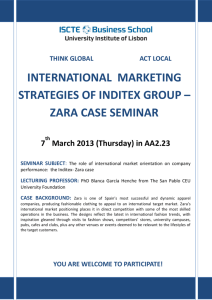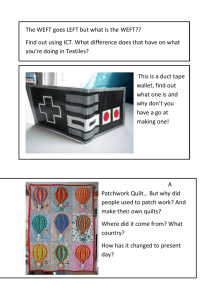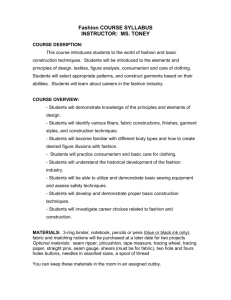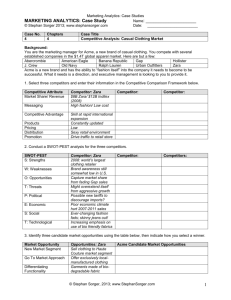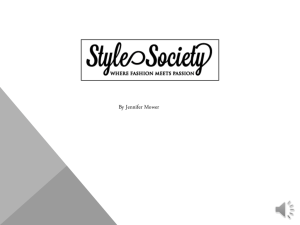Zara - WordPress.com
advertisement
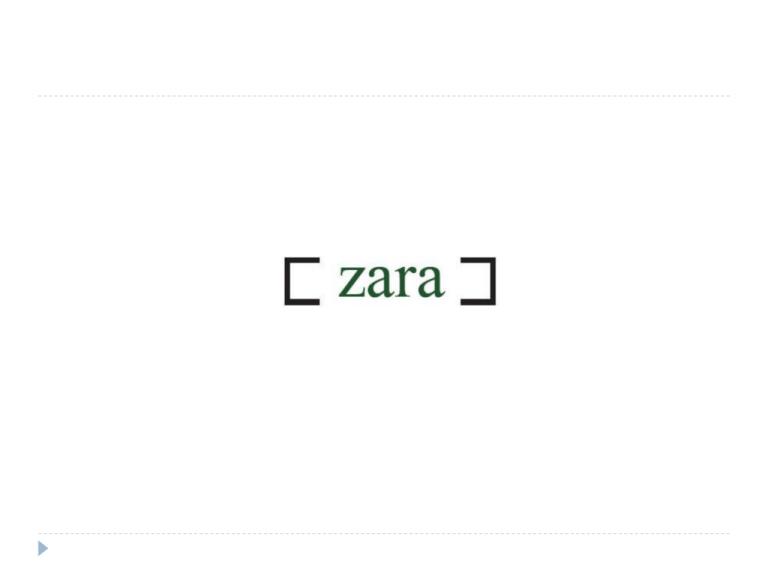
Existing service map in India Kids,Mens, Womens (casual, formal) (Online) Home decor Online shopping Clothes and apparels zara Shoes accessories Zara phone applications Look book Gift card/ vouchers Delivery shipping Existing Marketing Strategy Loyalty programs To create a link with its customers Quick change in fashion trends Relies more on location of retail establishment rather than on advertising Only 0.3% of revenue is spent on advertising, compared to its competitors who spend nearly 3.5% They have production houses in low wage countries, benefiting from lower class labor and operating costs They out source 40% of the entire production while the rest is done in house Vertical integration – own production houses (reacts more quicker than other competitors) Manufacturing its own products Alterations No advertisement (only word of mouth) Exchanging in any country SECRETS OF ZARA Design work in normal life Fast response, to city trends Its mass production, but classy ZARA- short, sharp, works across the globe Green frock-wind turbines, solar power, packaging is recycling and reuse. Seductive/eco design for the stores-light Rome-LEED platinum International ( zara home – sustainable ) Key success factors Short lead time = more fashionable clothes Lower quantities = scarce supply More style = more choice, more chances of it being a success Unordinary supply chain – highly competitive advantage Chose to handle design, production distribution in house Manager of the store reports to Spain head quarters everyday and changes in design are done accordingly ZARA Performance Reaps cost reduction benefit from economic scale NO customization in marketing strategy Low cost and high quality strategy on global scale Did NOT follow localization in any of the existing countries SWOT analysis STRENGTH Providing quality runway fashion at the best price Wide geographical market presence WEAKNESS Product recall Advertisement opportunities OPPURTUNITIES THREATS Introduce ZARA HOME in India Opening their own production house in India Intense competition Demand for plus size garments Value chain Inbound logistics Operations Outbound logistics Marketing and sales Operation management Volume Variety visibility REBRANDING STRATEGY REBRANDING STRATEGY Designer collaboration Helps the brand to move to higher and broader market Focus on localization Maintain relation between production and distribution system Packaging (using tote bags) Every time a customer shops at Zara using the bag provided they earn sustainable points followed by a discount. Deconstruction of higher end garments Challenges encountered Solutions provided Cultural issues Provision of training Language issues Research and analysis of various markets Technical issues Acquisition of new work force procedures CONCEPT INTERTWINE IN TERMS OF INTERIORS FASHION INTERIORS Existing Zara interiors characteristics Corporate lighting Uniform design by the central department Recessed ceiling General lighting Window display is common Mannequins –neutral background lighting spots light Halogen low voltage SUSTAINABLE STANDARDS: new solutions Energy management : LED’s long lasting durable mercury free prevents heat build up (reducing costs) more efficient Solar panels for obtaining energy from sunlight Daylight saving More and better circular ventilation • Water management : • • • • • • • Low flush toilets Flushing consumes 30%of normal water use Low flush can reduce consumption by 15% Spray tap (sensor controlled taps) SUDS (Sustainable urban drainage system) Rainwater harvesting (water stored can be reused for watering plants, toilet flushing Storage of water for long periods of time Other saving methods High efficient hand dryers are used for less usage of toilet paper No paper bills, mailing services and check in on tabs Price tags (labels) made from left over fabric Dual flush toilet and low flow faucets Zero Waste All the waste on the retreat is processed and reused all waste except plastics that we send out to a recycling unit all black water which is the flush water in the rooms, goes into a leech pits that convert the waste to manure over time all grey water from the hand wash water is used to recharge the ground water, used for gardening PLAN SECTION ELEVATION PERSPECTIVE SKETCHES Materials Cotton rope with hemp cord Cork Bamboo Flooring Wall Cladding (Store) Eco Resin Flooring (Trial Room) Construction Material The bricks used in the buildings were made on the site. We used the soil that we got when we dug for the foundation The bricks were then sun baked and were ready for use. These mud bricks are natural air conditioners as they insulate the interiors from extreme heat or cold. FASHION What is sustainable design in terms of fashion ? Fashion that leaves the least impact on the environment throughout it's Lifespan, that is, from creation through it's long life and once it reaches it's usable life's end. Designers and Brands must be aware of the energy it uses, carbon footprint, waste, transportation and the end of life strategies. Eco-friendly ways of Producing Fashion Zero-waste Fashion - is a way of cutting fabric without having to waste any fabric by working according to the width of fabric. Waste Fabrics that do not get used can be made into tags Thrift stores can be set up in stores for consumers to donate clothing. These clothes can be recycled and reused. Local weavers and artists can be involved for hand weaving techniques. All dyes used must be natural and should have no impact on the environment. Eco-friendly ways of Producing Fashion The usage of organic, chemical free fabrics must increase. Consumers need to be aware of how sustainable fashion will help the planet. It can be done by attaching little booklets of recycled paper, with information about eco friendly fashion. Using Fabrics like Organic Cotton, Jute, Bamboo, Tencel, Cork, Organic linen is a smart way to start off an eco friendly collection Fabrics like Jute and Organic Cotton are widely grown in places like Tamil Nadu and the Bengal Delta. A 100 per cent denim line for women and men can be introduced. Organic denim is made from organic cotton and dyed with natural indigo. Natural elements like shells or cork can replace buttons and zippers SUSTAINABLE FASHION COLLECTION Materials Materials consumption Pre-consumption - Consumption - Post Organic cotton - it is grown without using chemicals It is softer and chemical free - Since it is not treated with harsh chemicals and pesticides, and it is a healthier and cleaner product less process, organic Conservation of Biodiversity cotton is durable. It can be easily dyed. Jute - It is a vegetable fiber - Slightly rough, textured - 100 per cent biodegradable Very low pesticide and fertilizer needs Durable and long lasting It accepts dyes and also blends with other synthetic and natural fibers. Caustic soda can be used to improve the feel, appearance and softness. Materials Tencel - dyed to high quality - extremely smooth surface, rich color, - biodegradable standards because of its highly absorbent drapes beautifully, breathable and fibers – lightweight Bamboo - Craftsmen and local weavers for - the bamboo fabric is extremely soft and - biodegradable weaving the bamboo silky like. The bamboo also can be weaved It does not require the use of chemicals - with different techniques The stalk is cut off above ground so farmers don't have to keep planting it as it grows back It requires no irrigation prevents soil erosion Organisations Animal Equality : Started in UK, spread to India Follows Veganism lifestyle (respect for animals) (no exploitation) (saving from being harmed or killed) IDA (In defense of animals) Sponsor a pet Make a donation (helping the organization) PLANT A TREE Partnership with this organization helps to plant a tree for every purchase on the Zara website. References http://eartheasy.com/sustainability http://www.calrecycle.ca.gov/greenbuilding/materials/ http://www.epa.gov/iaq/ia-intro.html http://www.building.co.uk/data/sustainability-managingwater-consumption/3090094.article http://www.stairropes.com/ropes.html http://www.idaindia.org/index.htm http://www.animalequality.net/ http://laure.dubois.over-blog.com/article-sustainablematerials-interior-design-85820225.html http://retaildesignblog.net/tag/retail-concept/ http://www.sustainabledesigners.org/ Thank you Nishita Puttagunta Anusha Kothari Nagareddy Kshatriya Fanechka Fernandes Reshma
